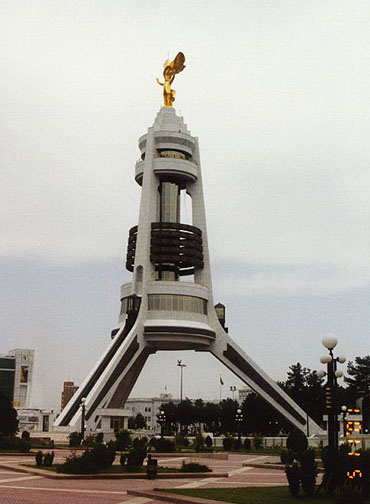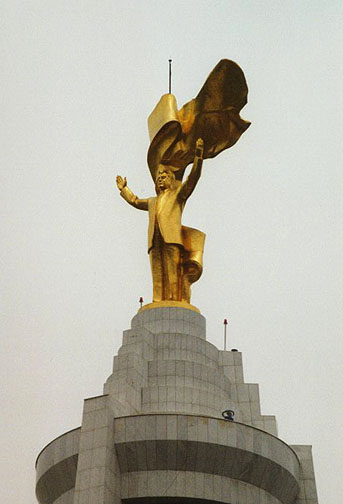

Turkmenbashi
the monuments in Ashkabat

Arch of Neutrality

statue of
Turkmenbashi
(revolves daily
Niyazov, Saparmurad A. (1940-2006), Turkmen politician, who became president of the Turkmen Soviet Socialist Republic (SSR) in 1990 and retained the presidency after Turkmenistan gained its independence from the Union of Soviet Socialist Republics (USSR) in 1991. Born in Ashgabat, the capital of Turkmenistan, and raised as an orphan, Niyazov was educated at the Polytechnic Institute in Saint Petersburg, Russia. He became a member of the Communist Party in 1962. After working as an instructor at a prospecting works from 1959 to 1967, Niyazov held a series of party positions. In 1985 he became president of the Council of Ministers of the Turkmen SSR, and the first secretary of the Ashgabat City Committee of the Turkmen Communist Party. In October 1990 Niyazov became president of the Turkmen SSR, and he maintained this post after Turkmenistan declared its independence in October 1991. Before the dissolution of the USSR in December 1991, he was also a member of the Politburo and the Central Committee of the Communist Party of the Soviet Union.
the Palace of Turkmenbashi
In December 1991 Niyazov arranged for the name of the Turkmen Communist Party to be changed to the Democratic Party of Turkmenistan, and he became its chairman. In May 1992 Niyazov oversaw the passage of a new constitution that gave the president extraordinary powers. Under this constitution, the president was made head of government as well as head of state, with the option to appoint a prime minister at any time. The president was also given the authority to appoint and remove all judges. In presidential elections held in June, Niyazov received a reported 99.5 percent of the vote.
National Museum of Turkmenistan
The Communist Party of Turkmenistan was renamed the Democratic Party of Turkmenistan (DPT) in December 1991, when the Soviet Union collapsed. The party retained its position as the republic’s only legal party, whereas in other former Soviet republics the Communist Party was suspended or dissolved. President Niyazov is head of the DPT, which was the only standing party in the legislative elections of 1994. In late 1992 Niyazov announced that as a first step toward establishing a multiparty system, the Peasants’ Party, founded that year by an agrarian-interest faction in the Majlis, would eventually be permitted to register. As of early 1998, however, the party was not yet registered. Several opposition groups have been officially banned, including a popular front organization called Agzybirlik, founded in 1989.
"world's largest" fountain
After Turkmen independence, Niyazov sought to develop the republic's economy. He encouraged foreign investment in fossil fuel extraction and sponsored various projects to develop the country's infrastructure. He also made a pilgrimage to Mecca, Saudi Arabia, and received $10 billion in aid from the Saudi government.
Turkmenbashi on top of the World
Niyazov’s leadership became increasingly authoritarian during the 1990s. In September 1993 he defended his policy of tight censorship of the press as a prerequisite for stability and peace in the country. In a referendum held in January 1994, nearly 100 percent of the voters endorsed Niyazov's leadership, allowing him to extend his presidency until 2002.
New Independence Monument
Historical figures with Niyazov's eagle emblem
As Niyazov’s style of leadership has been increasingly authoritarian, he has developed a cult of personality. Numerous streets, public buildings, and institutions are named after him, and he is officially called Turkmenbashi (Leader of the Turkmens). Political freedoms are routinely suppressed in Turkmenistan. Niyazov’s government controls the media, and censorship is widespread because freedom of the press is not guaranteed in the constitution. The government has sought to prevent the development of a fundamentalist Islamic movement in Turkmenistan and has maintained control over the Islamic hierarchy, which publicly supports Niyazov. Niyazov has not allowed political parties other than the DPT to participate in government, forcing the opposition underground.
Contributed By: Kurt
E. Engelmann for Microsoft Encarta
![]()
![]()